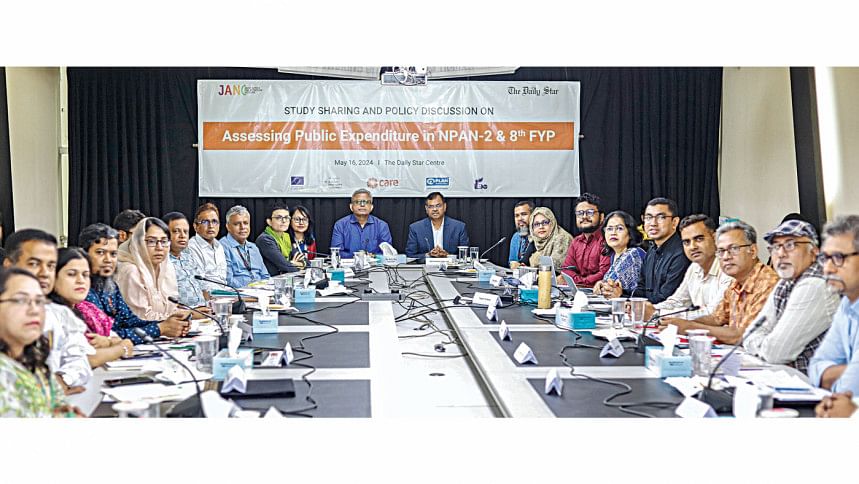Nutrition budget underutilised

Bangladesh does not have a dedicated nutrition budget. On top of that, ministries don't utilise the full funds allocated to them for nutrition related activities, said speakers at an event yesterday.
A recent assessment of government investment in nutrition-related interventions across seven ministries revealed poor utilisation rates.
For example, the education ministry and LGRD ministry could use only 49 percent of the allocation, while the health ministry and the food ministry utilised 62 and 66 percent of their allocations, respectively, according to the National Plan of Action for Nutrition (NPAN) 2016-2025.
Prepared by South Asian Network on Economic Modeling, the findings of the study, titled "Assessment of Government Investment in Nutrition-related Interventions of Selected Ministries," were presented at an event yesterday.
The event, titled "Study Sharing & Policy Discussion on Assessing Public Expenditure in NPAN-2, 8th five-year plan," was jointly organised by Joint Action for Nutrition Outcome and The Daily Star, supported by CARE Bangladesh.
Dhaka University Professor and Research Director of SANEM, Sayema Haque Bidisha, shared that among the seven projects aligned with the nutritional action plan in the health and family planning ministry, four have been completed, leaving 29 percent of the budget unspent.
Similarly, out of 21 nutrition related projects in the food ministry, 12 are completed, one is ongoing, and eight have shown no progress.
The study also highlighted that Bangladesh's per capita nutrition expenditure was US $18 in 2016-17, significantly lower than Bhutan's US $29 for the same period.
As per the study, key obstacles to implementing NPAN2 include inadequate budget allocation, socio-cultural complexities, and a lack of flexible planning and execution.
To address nutritional concerns effectively, the study recommended adopting a "3M" strategy -- multi-sectoral, multi-stakeholder, and multi-level.
Md Shahidul Alam, director general of Food Planning and Monitoring Unit of food ministry, emphasised the need for increased investment in nutrition.
Mentioning that there is no alternative to awareness about nutrition, he said, "National Dietary Intake Guidelines have been prepared in 2020. But the reality is that these guidelines have not reached the common people in the last four years."
Margherita Capalbi, portfolio manager of European Union, suggested implementing a mandatory nutrition reporting system and strengthening the Bangladesh National Nutrition Council.
Professor AQM Shafiul Azam, director (Planning and Development) of Directorate of Secondary & Higher Education, highlighted the importance of coordinated efforts among ministries, emphasising the need for projects to reach the grassroots effectively.
Hasan Shahriar Kabir, former director general of Bangladesh National Nutrition Council, emphasised on down-to-up approach for the upcoming nutrition national action plan.
He also stressed the importance of avoiding project overlap, especially in NGO initiatives.
Professor Syed Abdul Hamid of Institute of Health Economics of Dhaka University emphasised the need for increased budget allocation and dedicated manpower in the nutrition sector, suggesting the establishment of nutrition offices at district levels.
The event was addressed by CARE Bangladesh's Acting Deputy Country Director-Program Dr. Ikhtiar Uddin Khandaker, Director Aamanur Rahman; BRAC University Professor Sharmind Neelotpol, Nutrition International Country Director Saiqa Siraj, Institute of Public Health Nutrition Division Chief (Lab) Shyamal Kumar Roy, Democratic Budget Movement Joint Secretary Sekender Ali Mina, BNNC Deputy Director Nusrat Zahan Mithen, Kursha Union Parishad Chairman Md Abdul Mozid, Food and Agriculture Organization Nutrition & Gender Specialist Masuma Chowdhury, FPMU Research Director Md Mahbubur Rahman, WAVE Foundation Assistant Director Aniruddha Roy, BRAC Programme Manager Mohammad Mahmudul Hasan, Action Aid Manager Amit Dey, PLAN International Bangladesh Advisor Syed Md Nuruddin, SA TV Business Editor Salahuddin Bablu, among others.
Tanjim Ferdous of The Daily Star moderated the event.

 For all latest news, follow The Daily Star's Google News channel.
For all latest news, follow The Daily Star's Google News channel. 







Comments